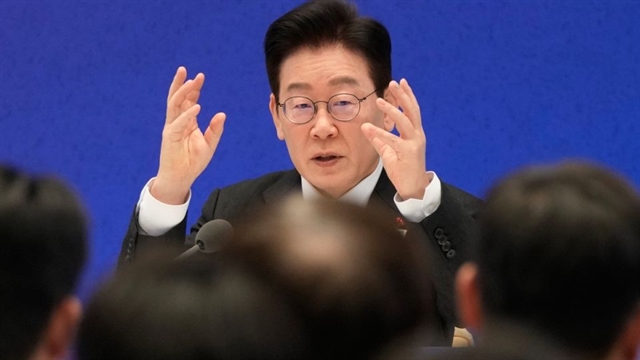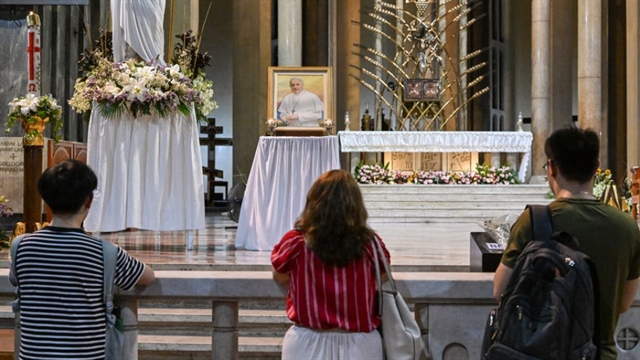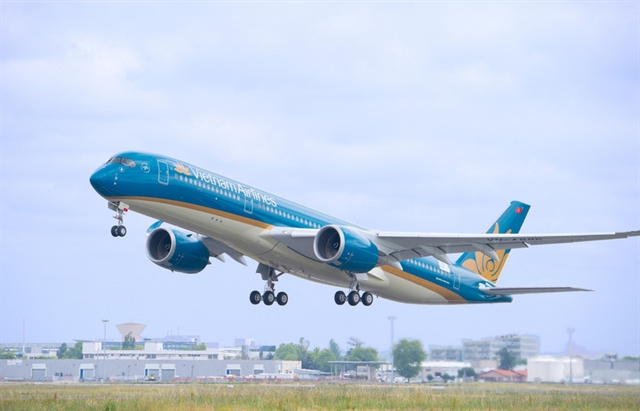 World
World


|
| People pray in front of a portrait of Pope Francis after mass at Baclaran Church in Paranaque, Metro Manila on Monday, following the death of Pope Francis in the Vatican. — AFP/VNA Photo |
MANILA — The death of Pope Francis has stirred an outpouring of grief across Asia, where the Argentina-born pontiff was regarded not just as the head of the Catholic Church, but also as a rare global figure of moral clarity and compassion.
He was 88, and had recently survived a serious bout of double pneumonia.
In the Philippines, home to Asia’s largest Catholic population, the bells of Manila Cathedral tolled on Monday afternoon as news of the Pope’s passing spread.
President Ferdinand Marcos Jr said Pope Francis will be remembered for leading “with a heart open to all, especially the poor and the forgotten”.
“By example, Pope Francis taught us that to be a good Christian is to extend kindness and care to one another. His humility brought many back to the fold of the Church,” Marcos posted on his official Facebook page.
The sorrow is deeply personal for Filipinos, whose country has 85 million Catholics out of a population of 108 million. Many remember Pope Francis’ historic four-day visit in January 2015, when he celebrated an open-air mass in Manila that drew a staggering seven million devotees, making it the largest papal gathering in history.
“This is heartbreaking news for the faithful, and for those like me who only slowly found their way to faith because someone at the helm reminded us that the Church could also be a place to breathe,” said Filipino sociologist Ashley Presto on X. “Pope Francis made being Catholic less morally suffocating.”
Leaders across the globe offered condolences to the world’s 1.4 billion Catholics and praised the Pope’s efforts to reform the Catholic Church.
In Asia, leaders also expressed their sorrow and paid tribute to Pope Francis, who had visited Indonesia, Papua New Guinea, Timor-Leste and Singapore in September 2024 – the longest foreign trip of his papacy by duration and distance.
The Roman Catholic Archdiocese of Singapore released a statement on Monday evening which read: “He (Pope Francis) was a champion of unity and hope, not just for Catholics, but for the world, especially the weak, the marginalised and the poor.
“Pope Francis’ constant call for inclusivity gave the world a Church that welcomed all, especially those who yearned for love, mercy, and hope. His actions inspired the faithful to be the face of Christ to others and reach out to those on the fringes of society.”
In predominantly Catholic Timor-Leste, President Jose Ramos-Horta said the Pope’s death was a “tremendous loss for the world, not just Christians”. He said national flags would be flown at half-mast for one week.
In Indonesia, Minister of Religious Affairs Nasaruddin Umar described Pope Francis as “one of our best friends”. Nasaruddin remembered working with the pontiff during his visit to Indonesia, including his time at the Istiqlal Mosque in Jakarta.
“We cannot forget his services and friendship,” said Nasaruddin. “I hope that the cooperation between Indonesia and the Vatican will continue to follow his path”.
South Korea’s Acting President Han Duck-soo, who is also the Prime Minister, paid tribute, saying: “The Pope delivered a message of love and solidarity to humanity through the teaching that ‘we are all brothers and sisters’, and he devoted his life to the poor and marginalised by living a life of peace and reconciliation.”
Pope Francis visited South Korea, where about 11 per cent of the population are Catholics, in 2014.
Malaysian Prime Minister Anwar Ibrahim praised Pope Francis for building bridges among different faiths that earned the respect of many, including “in the Muslim world”. “He spoke with moral clarity on the immense suffering in Gaza, reminding the world that we must show the same compassion to all victims of violence, wherever they may be,” Datuk Seri Anwar posted on Facebook.
Indian Prime Minister Narendra Modi said he was “deeply pained” by the Pope’s death, calling him “a beacon of compassion, humility and spiritual courage”.
As the first Latin American pontiff, Pope Francis ushered in a new era for the Catholic Church.
Born Jorge Mario Bergoglio, he was elected pope on March 13, 2013, surprising many Church watchers, who had seen the Argentine cleric, known for his concern for the poor, as an outsider.
He inherited a Church that was under attack over a child sex abuse scandal and torn by infighting in the Vatican bureaucracy, and was elected with a clear mandate to restore order.
As his papacy progressed, Pope Francis faced criticism from conservatives, who accused him of trashing cherished traditions.
Often regarded as the “pope of the peripheries”, he championed the poor, welcomed migrants, reached out to LGBTQ+ Catholics, and called for urgent climate action.
But his progressive stance also drew sharp criticism from conservative factions within the 2,000-year-old Church that viewed his reforms as a break from tradition.
While he struggled with internal dissent, Pope Francis became a global superstar, drawing huge crowds on his many foreign travels as he tirelessly promoted interfaith dialogue and peace, taking the side of the marginalised, such as migrants. — The STRAITS TIMES/ANN




